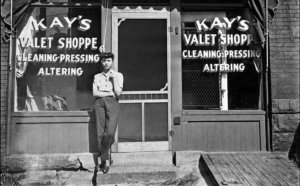A large literature has detailed the seminal roles played in the Civil Rights Movement by activists, new political organizations, churches, and philanthropies. But black-owned businesses also provided a behind-the-scenes foundation for the movement’s success.
Many black-owned businesses operated across the South because they provided goods and services to black customers who could not attain them from white businesses because of segregation. These small business owners very often played roles in civic matters that their counterparts in larger firms did not. Their civic participation and support contributed far more to the potential for political progress than scholars have recognized. Some accounts of the Montgomery Bus Boycott, for example, underestimate the significance of the role played by Montgomery’s community of black-owned businesses, from taxis to pharmacies. Examples from the Civil Rights Movement in Mississippi also illustrate the importance of local small businesses: black business owners were on the front lines, resisting strong pressures from the white community. This paper analyzes these episodes and places them in the context of black-owned businesses in the United States in the 1950s and 1960s, albeit descriptively given the unevenness and unavailability of standardized statistics. It also traces the debates over “Black Capitalism” and how the decline of segregation led to dramatic reorganizations of black businesses.

